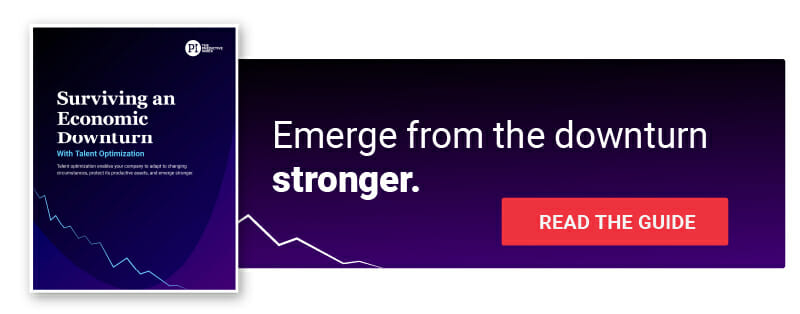He let me have it good.
My LinkedIn post (below) had triggered him—especially the “no fault of their own” part.
He sent me this message:
“If you can sit in a room and make decisions about the futures of others, then you should sacrifice your job too. Please spare me the ‘it’s no fault of their own’ bull … I heard the same excuse.”
See, this individual’s company had laid him off and told him it was no fault of his own. But he wasn’t buying it. He felt his company wanted to save money by outsourcing jobs, his included. And that’s how I found myself on the receiving end of some major displaced anger.
Employees have every right to feel angry.
First, let me be clear about one thing. I understood why this person was angry (angry enough to message a complete stranger on LinkedIn). It’s the same reason thousands of employees are angry following RIFs: A lot of leaders in my position make poor choices that only exacerbate employee stress.
Terina Allen wrote in Forbes: “Layoffs happen and should even be expected from time to time. But managers unnecessarily exacerbate the challenges for those impacted by withholding information, providing misinformation, being overly opaque, failing to plan for and manage a consistent process, and by overlooking the importance of addressing human dynamics.”
Too many companies don’t have a solid crisis communication plan in place. Employees have no warning that layoffs are imminent. And so when they do come, they hurt like a sucker punch. After years, or in some cases decades, of giving it their all, loyal employees are “rewarded” with a surprise pink slip.
We need to do better by our people.
>> Looking to implement or improve your crisis communication plan? There’s some great advice for executives in our Surviving an Economic Downturn With Talent Optimization guide:
Here’s how I responded to his message.
So there I was, staring at my laptop and thinking about how I should respond to this person.
First, I let him know that both my business partner, Daniel, and I had taken a 100% pay cut a month before the layoffs happened and that the rest of the senior team took a 25% pay cut. As team-first leaders, we all agreed that it was the right decision.
Next, I looked at his LinkedIn profile. This person had some great experience! So I shared with him the names of some companies in his industry that were hiring right now, and a link to apply.
Shortly after I sent that information along, he replied:
“Thanks, Mike, I really appreciate it and I apologize. I’m just venting a little. This whole ordeal blindsided me … I’ve just been bitter and angry about it.”
We should all respond to anger with kindness.
What shocked me was how fast this person turned around. He was screaming for help, and I’m so glad I responded the way I did. Though it only took me a minute to provide him with those names and that link, it clearly made him feel a little better. It’s too bad his former manager or company didn’t take the same minute to be human.
I leave you with two questions:
- What can you as a leader do today to ensure your employees feel valued and cared for?
- What can you as a human do tomorrow to help a stranger who’s in need of kindness?
It’s hard out there right now, so let’s all assume good intent and be kind to one another. Let’s use the discipline of talent optimization to weather this economic storm and emerge stronger.









